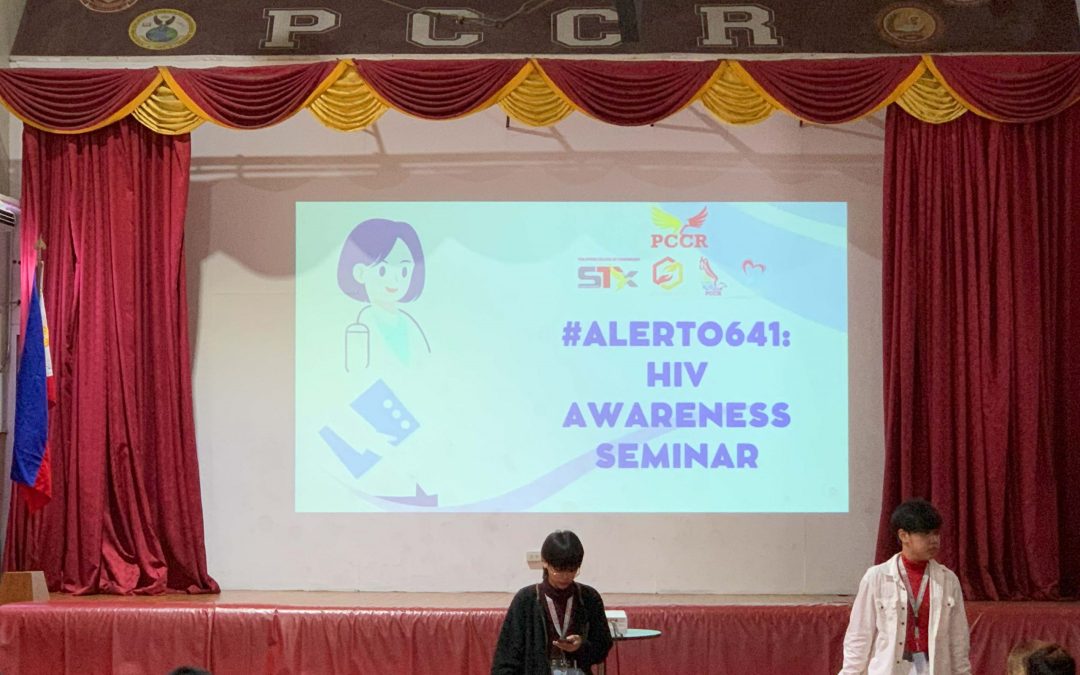As we move towards a more inclusive and accepting society, we are facing the issue of Human Immunodeficiency Virus (HIV) and Acquired Immunodeficiency Syndrome (AIDS) in our country. The Philippine College of Criminology, in partnership with the Manila Social Hygiene Clinic of the Manila City Department, conducted an HIV Awareness Seminar last November 28, 2023, at the PCCR Gymnasium. The event was made possible with the help of the PCCR Student Experience Department, the PCCR Community Extension and Services Department, and the PCCR Kulay641 Organization.
“Knowledge is not just important, but a key for people to be kinder and for a healthier society.” This message from Ms. Ice Salvador, the adviser of the PCCR Kulay641, reminds the audience of the role of knowledge in facing the issue of personal health. This is an important takeaway: people should always be mindful of the need to be knowledgeable when tackling social issues that hurt and challenge our society. We must proactively do our part in ending the criticism and discrimination experienced by those facing the problems of HIV and AIDS. Accepting them and their illnesses is a way for us to have a unified society, and this is the hope of the Kulay641 organization within our community.
During the seminar, Ms. Angela Dogillo of the Manila Social Hygiene, informed the audience about the difference between the Human Immunodeficiency Virus (HIV) and Acquired Immunodeficiency Syndrome (AIDS). In line with this, the audience learned about the effects of HIV in our body and how it can lead to AIDS. The speaker clarified that HIV and AIDS are not deadly at all, but it is the opportunistic infection that is deadly and causes the death of someone infected with HIV and AIDS. We should be reminded that HIV and AIDS aren’t contagious through sweat and saliva transfer, however it can be transmitted only through four bodily fluids: blood, semen of men, breast milk, and vaginal fluid. The mode of transmission of the virus can happen in three ways: unsafe sex intercourse, infected blood transfer, and through mother-to-child transmission. In other words, HIV transmission can’t be acquired through hugging, touching, kissing, or even sharing utensils, thus, there’s no need to discriminate against or even isolate them.
The speaker also discussed the ABCDE in preventing transmission of the Human Immunodeficiency Virus (HIV). “A” stands for “Abstinence” of any sexual intercourse, which lessens the possibility of transmitting the virus and getting infected. “Being mutually faithful” is for the “B,” which is vital in keeping a relationship strong and safe against the virus. “C” is for “Correct and consistent use of condoms” while having sex. “D” is “Don’t use illegal drugs and sharing needles” to lessen the mode of transmission. Lastly, E is for “Education and early treatment” to protect one’s health from being infected by the virus and worsening the effects of the virus.
The video presentation from the Manila Social Hygiene, explained the meaning of “U=U” in the promotion of the fight against HIV and AIDS campaign. The “U=U Campaign” talks about the importance of knowing one’s status by having consistent HIV tests. It is important to have a definite awareness of one’s health to prevent the transmission or worsening of the virus if infected, which could lead to AIDS. One drop is all it takes for one life to be saved and to live a healthy and HIV free life. The speaker also emphasized that being undetectable is equal to being untransmittable, thus being undeniably you.
A concluding video message from Sen. Risa Hontiveros was played, leaving a lasting message for the audience. As simple as it is, according to Sen. Risa, “Discrimination stands in the way of healing,” a problem that we must aim to solve. Sen. Hontiveros emphasized that, “HIV and AIDS is a social problem that requires community-based solutions.” Backing that our role in the continuous dissemination of correct information to prevent the transmission of the virus. As Mr. Vincent Agustin stated in his closing remarks, he challenged everyone to do their part in spreading correct information and knowing one’s status by participating in the HIV testing. The Manila Social Hygiene Health Workers offered free HIV testing and encouraged both students and staff to get tested and find out their status. This event is vital in solving the issue of HIV and AIDS, for it is our role to be the beginning of an end to the stigma of discrimination and fear.
Text: Joseph Carlo B. Halili

